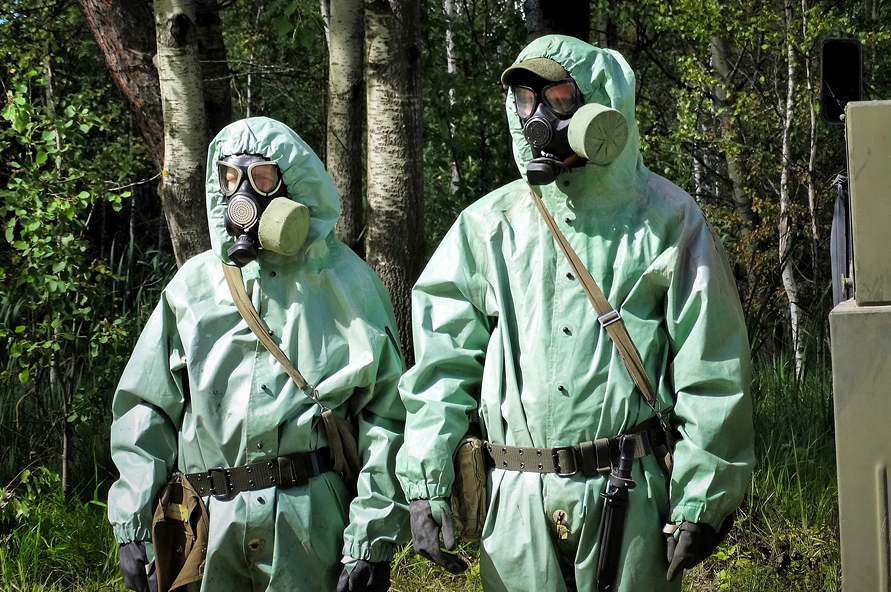ASTM D790 Flexural Strength Testing of CBRN Composites
The ASTM D790 standard is widely recognized for its stringent requirements in determining the flexural strength of materials, including composites. In military applications, particularly with Nuclear, Biological and Chemical (NBC) testing, this test method plays a crucial role in ensuring the integrity and reliability of composite materials used in protective gear, structural components, and other critical equipment.
ASTM D790 provides comprehensive guidelines for preparing specimens, conducting tests, and interpreting results. This service focuses on the flexural strength testing of CBRN (Chemical, Biological, Radiological, and Nuclear) composites that are essential in military environments where personnel safety and operational effectiveness are paramount.
The process involves several key steps:
- Specimen Preparation: Specimens must be cut to specific dimensions as per ASTM D790. The choice of cutting technique is critical, as it can influence the test results. Proper conditioning and curing are also essential.
- Loading Conditions: Testing occurs under controlled environmental conditions that mimic real-world scenarios. This ensures accurate measurement of flexural strength under various stress conditions.
- Data Analysis: After testing, data is meticulously analyzed to determine the flexural strength. Reporting standards ensure that results are presented in a manner consistent with industry best practices.
The test method is vital for ensuring compliance with military standards and regulations. It helps in validating the performance of composite materials against potential threats in NBC environments. This service ensures that all testing adheres to ASTM D790, thereby providing reliable data that can be used for informed decision-making by quality managers, compliance officers, R&D engineers, and procurement teams.
The process involves meticulous attention to detail throughout each step of the testing procedure. Rigorous adherence to ASTM standards guarantees consistent, repeatable results across multiple tests and locations. This ensures that any deviations from expected performance can be confidently attributed to material or environmental factors rather than procedural inconsistencies.
For quality managers and compliance officers, this service offers a robust framework for ensuring that all materials used in military applications meet the highest standards of safety and reliability. R&D engineers benefit from detailed insights into how different variables affect flexural strength, allowing them to optimize designs effectively. Procurement teams gain assurance that they are sourcing materials that have undergone rigorous testing to ensure their suitability for use in NBC scenarios.
The ASTM D790 standard is essential not only because it provides a standardized approach but also because its acceptance is widespread within the military sector. Compliance with this standard ensures interoperability and compatibility across various platforms, enhancing overall operational effectiveness.
Applied Standards
The ASTM D790 flexural strength testing service adheres strictly to international standards such as ASTM D790. These standards provide a detailed framework for the preparation, handling, and testing of composite materials. The application of these standards ensures that every test conducted is consistent with industry best practices.
ASTM D790 specifies precise methods for preparing specimens, including dimensions, conditioning, and curing. This standard also outlines loading conditions and environmental controls necessary to ensure accurate measurement of flexural strength. Reporting guidelines are equally stringent, ensuring all results are presented in a clear, concise manner.
The service ensures that every aspect of the testing process aligns with ASTM D790 requirements. From specimen preparation through data analysis, each step is meticulously followed to maintain consistency and reliability. This adherence to standards enhances credibility and trustworthiness, providing stakeholders with confidence in the accuracy and validity of test results.
Industry Applications
- Military Protective Gear: Ensuring that protective gear can withstand the rigors of NBC environments is critical. ASTM D790 testing helps validate that materials used in these applications meet necessary strength and durability standards.
- Nuclear Facilities: Materials used in nuclear facilities must be resilient to harsh conditions, including radiation exposure. Flexural strength testing ensures these materials can perform reliably under such conditions.
- Biological Containment Structures: Structures designed to contain biological agents require robust composite materials capable of withstanding mechanical stress without compromising containment integrity.
- CBRN Transport Vehicles: Vehicles used for transporting NBC materials need components that are strong and stable, ensuring safe transport under various environmental conditions.
The results from ASTM D790 flexural strength testing provide critical insights into the performance characteristics of composite materials in these applications. By adhering to this standard, manufacturers can ensure their products meet stringent military requirements while maintaining operational efficiency.
International Acceptance and Recognition
The ASTM D790 flexural strength testing service is internationally recognized for its rigorous approach to composite material testing. This standard has gained widespread acceptance in military, nuclear, and biological sectors due to its stringent requirements and consistent results.
- Global Standards: The method aligns with international standards such as ISO 178 and EN 3, providing a harmonized approach that is recognized worldwide. This ensures compatibility and interoperability across different platforms and regions.
- Aerospace Industry: The aerospace industry also employs ASTM D790 for evaluating composite materials used in aircraft structures. Its acceptance here underscores the standard’s reliability and accuracy.
- Nuclear Reactors: Nuclear reactors utilize composite materials that must withstand high temperatures and radiation exposure. Flexural strength testing ensures these materials can perform reliably under such conditions.
The international recognition of ASTM D790 adds significant value to the service offered by our laboratory. It provides a benchmark for quality assurance, ensuring that all test results are consistent with global expectations. This recognition fosters trust and credibility among clients and partners globally.





